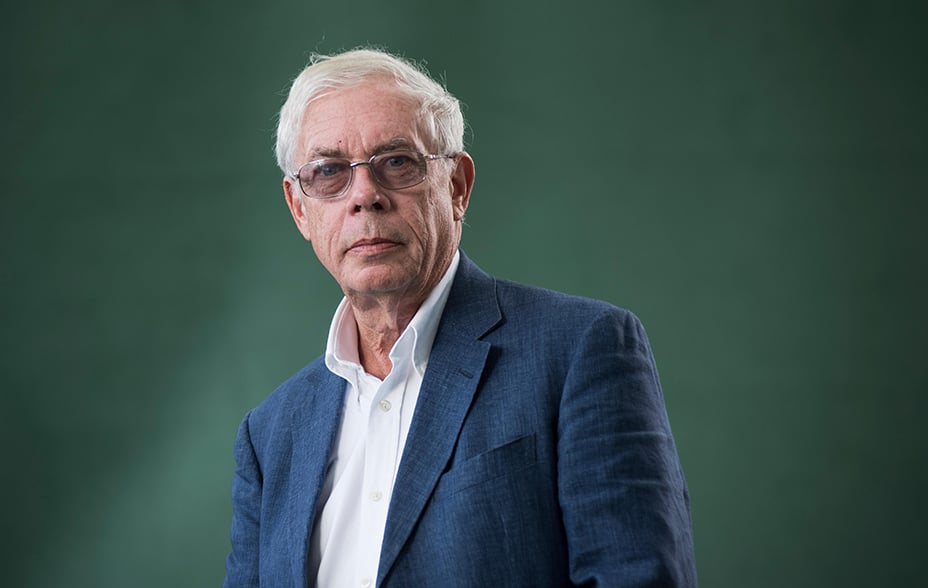
Potential for Profit and Loss
All investment strategies have the potential for profit and loss, your or your clients’ capital may be at risk. Past performance is not a guide to future returns.
Whether it’s in planning the invasion and occupation of Iraq or failing to anticipate global financial meltdown, policy makers have too often put complex but meaningless risk calculations before an understanding of what’s really going on. In their new book, Radical Uncertainty: Decision-making for an unknowable future, John Kay and former Bank of England governor Mervyn King explore how spurious calculations of probability help create false confidence and how we should avoid similar mistakes about our own financial futures.
In this interview, Professor Kay and James Anderson swap ideas on risk and uncertainty, and how they relate to asymmetric investment returns.
James Anderson: Radical Uncertainty starts out by saying that, just as the tax system 40 years ago needed revising from first principles, so economics does now. What reservations do you have about where economics has led us in the last 30 or 40 years?
John Kay: Major areas of economics have been predicated on the belief that all uncertainty can be characterised probabilistically. That’s been the mainstay of financial economics and macroeconomic theory over the last 30 or 40 years, a lot of it coming from the Chicago school of economics. Mervyn King and I think that belief is just wrong, and that much uncertainty cannot be characterised probabilistically. The subjective probabilities at the base of this kind of analysis simply don’t exist.
The betting shop I pass every day displays the odds on various horse races, and I’ve never even dreamt of thinking: ‘Gosh, these odds differ from my subjective probabilities, I’ll go in and place a bet’.
Most people, sensibly, just do not bet on most things. Once you’ve understood that, it’s an abuse of the concept of rationality to think that it requires that these ‘probabilities’ exist.
JA: Does this apply to investment? It seems the desire for quantification, and to say that you’ve ‘solved’ what risk is, is enforced by our financial system. Most of the industry says it can optimise for returns according to risk metrics, so you can choose your level of return and your level of risk. That thinking is both essential to the workings of investment banks and a critical opportunity for those of us who don’t think in those terms to generate investment returns.
JK: You are absolutely right to say that such thinking is both a mistake and an opportunity. What we mean by risk in Radical Uncertainty is what real people think of as risk. For most people risk is not uncertainty, risk is something bad, whereas uncertainty can be something good or something bad.
People think in stories, rather than numbers. In their business or in their personal finances they construct a reference narrative of how they expect things to play out, and risk is something that might derail that narrative.
If you think about risk that way, you realise it’s personal. What risk means for someone about to retire is very different from what it means for someone in their 20s. What risk means for a bank is very different from what it means for a retailer, and so on. And if risk means different things to different people, the idea that there’s some equilibrium in which there’s a single price for some objective thing called risk is just a mistake. In seeking a profitable strategy, it is important to understand how what you mean by risk differs from what other people mean.
So, it’s very important to think through your finances in an individual way in terms of what your own reference narrative and your own objectives are, and these will be different from those of most other people.
JA: One of the most intriguing facets of stock markets and corporates is that the upside skew is extraordinary. A very small number of companies can generate very high returns which is not captured by the models in financial economics.
JK: Exactly. Imposing statistical normality on distributions is part of the conventional approach to quantifying dispersion of returns.
JA: Are there any characteristics in the companies that subsequently appear to generate very high returns that are identifiable at the time of investment?
JK: It’s difficult. I’m not sure how far the work of people like Professor Hendrik Bessembinder, who has analysed the asymmetrical nature of returns, takes us in identifying common characteristics. We need to ask the question, and I think it’s a question that you have almost always been asking of these early-stage companies: ‘Can this company be a game-changer that generates stellar returns?’.
The classic archetype here is Tesla. None of us could have been sure that Tesla was going to change the world, but there was and is a narrative in which it does.
The economic development of the next two or three decades will not be about information technology as such, but the application of IT in other areas. Healthcare and autonomous vehicles are early examples, and there will be a lot more that we haven’t yet thought about.
Smart electricity grids are also interesting, because if people were to get serious about climate change, rather than just making emotional statements about it, it will be new technologies for transmission and storage of power that are going to make the difference.

JA: There are certain technologies that you can have a degree of confidence in, whether they be in those surrounding the rise of renewable energy or Moore’s law [which states that the number of transistors on circuits doubles every two years]. Something that puzzles me is that those seem like very high-likelihood outcomes, yet the stock market appears to underestimate them in their early years. Is the stock market structurally unable to grasp these possibilities?
JK: Conventional success on the stock market means not really understanding what’s going to happen but understanding what other people think is going to happen three months from now. It’s John Maynard Keynes’s famous metaphor of the beauty contest: you’re not judging who you think is the most beautiful but guessing who others will think is the most beautiful, and who other people think other people will think is the most beautiful.
JA: Is that how our task has become defined?
JK: Yes, it’s why the long-run investor is going to do better by standing away from this noise and accepting that you’re going to have lots of quarters of underperformance. It’s about understanding risk in this different way, by reference narrative rather than volatility.
JA: You’ve alluded to the characteristics a company needs for success in the future, emphasising the competitive advantage in providing broader systemic benefit. How is this changing, and what do we need to be aware of in thinking about investment for the next 20 years?
JK: Gosh, that’s a wide question. People talk endlessly about intangible assets, which seems to me mostly unhelpful. There are intangible assets like software and brands, but Apple’s value is not its software, which is not particularly remarkable, and it’s not its brand either. If I were to buy the Apple brand but not the capabilities, design and innovation that make Apple the company it is, I wouldn’t have much. We need to look at companies by reference to dynamic capabilities.
JA: Thank you John. You’ve left me with many more questions, but that’s what investing is: continually moving on to the next set of questions.
Risk Factors
The views expressed in this article are those of the interviewees and should not be considered as advice or a recommendation to buy, sell or hold a particular investment. They reflect personal opinion and should not be taken as statements of fact nor should any reliance be placed on them when making investment decisions.
This communication was produced and approved in August 2021 and has not been updated subsequently. It represents views held at the time of writing and may not reflect current thinking.
Stock Examples
Any stock examples and images used in this article are not intended to represent recommendations to buy or sell, neither is it implied that they will prove profitable in the future. It is not known whether they will feature in any future portfolio produced by us. Any individual examples will represent only a small part of the overall portfolio and are inserted purely to help illustrate our investment style.
This article contains information on investments which does not constitute independent research. Accordingly, it is not subject to the protections afforded to independent research, but is classified as advertising under Art 68 of the Financial Services Act (‘FinSA’) and Baillie Gifford and its staff may have dealt in the investments concerned.
All information is sourced from Baillie Gifford & Co and is current unless otherwise stated.
The images used in this article are for illustrative purposes only.
Important Information
Baillie Gifford & Co and Baillie Gifford & Co Limited are authorised and regulated by the Financial Conduct Authority (FCA). Baillie Gifford & Co Limited is an Authorised Corporate Director of OEICs.
Baillie Gifford Overseas Limited provides investment management and advisory services to non-UK Professional/Institutional clients only. Baillie Gifford Overseas Limited is wholly owned by Baillie Gifford & Co. Baillie Gifford & Co and Baillie Gifford Overseas Limited are authorised and regulated by the FCA in the UK.
Persons resident or domiciled outside the UK should consult with their professional advisers as to whether they require any governmental or other consents in order to enable them to invest, and with their tax advisers for advice relevant to their own particular circumstances.
Europe
Baillie Gifford Investment Management (Europe) Limited provides investment management and advisory services to European (excluding UK) clients. It was incorporated in Ireland in May 2018 and is authorised by the Central Bank of Ireland. Through its MiFID passport, it has established Baillie Gifford Investment Management (Europe) Limited (Frankfurt Branch) to market its investment management and advisory services and distribute Baillie Gifford Worldwide Funds plc in Germany. Similarly, it has established Baillie Gifford Investment Management (Europe) Limited (Amsterdam Branch) to market its investment management and advisory services and distribute Baillie Gifford Worldwide Funds plc in The Netherlands. Baillie Gifford Investment Management (Europe) Limited also has a representative office in Zurich, Switzerland pursuant to Art. 58 of the Federal Act on Financial Institutions ("FinIA"). It does not constitute a branch and therefore does not have authority to commit Baillie Gifford Investment Management (Europe) Limited. It is the intention to ask for the authorisation by the Swiss Financial Market Supervisory Authority (FINMA) to maintain this representative office of a foreign asset manager of collective assets in Switzerland pursuant to the applicable transitional provisions of FinIA. Baillie Gifford Investment Management (Europe) Limited is a wholly owned subsidiary of Baillie Gifford Overseas Limited, which is wholly owned by Baillie Gifford & Co.
China
Baillie Gifford Investment Management (Shanghai) Limited 柏基投资管理(上海)有限公司(‘BGIMS’) is wholly owned by Baillie Gifford Overseas Limited and may provide investment research to the Baillie Gifford Group pursuant to applicable laws. BGIMS is incorporated in Shanghai in the People’s Republic of China (‘PRC’) as a wholly foreign-owned limited liability company with a unified social credit code of 91310000MA1FL6KQ30. BGIMS is a registered Private Fund Manager with the Asset Management Association of China (‘AMAC’) and manages private security investment fund in the PRC, with a registration code of P1071226.
Baillie Gifford Overseas Investment Fund Management (Shanghai) Limited柏基海外投资基金管理(上海)有限公司(‘BGQS’) is a wholly owned subsidiary of BGIMS incorporated in Shanghai as a limited liability company with its unified social credit code of 91310000MA1FL7JFXQ. BGQS is a registered Private Fund Manager with AMAC with a registration code of P1071708. BGQS has been approved by Shanghai Municipal Financial Regulatory Bureau for the Qualified Domestic Limited Partners (QDLP) Pilot Program, under which it may raise funds from PRC investors for making overseas investments.
Hong Kong
Baillie Gifford Asia (Hong Kong) Limited 柏基亞洲(香港)有限公司 is wholly owned by Baillie Gifford Overseas Limited and holds a Type 1 and a Type 2 license from the Securities & Futures Commission of Hong Kong to market and distribute Baillie Gifford’s range of collective investment schemes to professional investors in Hong Kong. Baillie Gifford Asia (Hong Kong) Limited 柏基亞洲(香港)有限公司 can be contacted at Suites 2713-2715, Two International Finance Centre, 8 Finance Street, Central, Hong Kong. Telephone +852 3756 5700.
South Korea
Baillie Gifford Overseas Limited is licensed with the Financial Services Commission in South Korea as a cross border Discretionary Investment Manager and Non-discretionary Investment Adviser.
Japan
Mitsubishi UFJ Baillie Gifford Asset Management Limited (‘MUBGAM’) is a joint venture company between Mitsubishi UFJ Trust & Banking Corporation and Baillie Gifford Overseas Limited. MUBGAM is authorised and regulated by the Financial Conduct Authority.
Australia
Baillie Gifford Overseas Limited (ARBN 118 567 178) is registered as a foreign company under the Corporations Act 2001 (Cth) and holds Foreign Australian Financial Services Licence No 528911. This document is provided to you on the basis that you are a “wholesale client” within the meaning of section 761G of the Corporations Act 2001 (Cth) (“Corporations Act”). Please advise Baillie Gifford Overseas Limited immediately if you are not a wholesale client. In no circumstances may this document be made available to a “retail client” within the meaning of section 761G of the Corporations Act.
This document contains general information only. It does not take into account any person’s objectives, financial situation or needs.
South Africa
Baillie Gifford Overseas Limited is registered as a Foreign Financial Services Provider with the Financial Sector Conduct Authority in South Africa.
North America
Baillie Gifford International LLC is wholly owned by Baillie Gifford Overseas Limited; it was formed in Delaware in 2005 and is registered with the SEC. It is the legal entity through which Baillie Gifford Overseas Limited provides client service and marketing functions in North America. Baillie Gifford Overseas Limited is registered with the SEC in the United States of America.
The Manager is not resident in Canada, its head office and principal place of business is in Edinburgh, Scotland. Baillie Gifford Overseas Limited is regulated in Canada as a portfolio manager and exempt market dealer with the Ontario Securities Commission ('OSC'). Its portfolio manager licence is currently passported into Alberta, Quebec, Saskatchewan, Manitoba and Newfoundland & Labrador whereas the exempt market dealer licence is passported across all Canadian provinces and territories. Baillie Gifford International LLC is regulated by the OSC as an exempt market and its licence is passported across all Canadian provinces and territories. Baillie Gifford Investment Management (Europe) Limited (‘BGE’) relies on the International Investment Fund Manager Exemption in the provinces of Ontario and Quebec.
Oman
Baillie Gifford Overseas Limited (“BGO”) neither has a registered business presence nor a representative office in Oman and does not undertake banking business or provide financial services in Oman. Consequently, BGO is not regulated by either the Central Bank of Oman or Oman’s Capital Market Authority. No authorization, licence or approval has been received from the Capital Market Authority of Oman or any other regulatory authority in Oman, to provide such advice or service within Oman. BGO does not solicit business in Oman and does not market, offer, sell or distribute any financial or investment products or services in Oman and no subscription to any securities, products or financial services may or will be consummated within Oman. The recipient of this document represents that it is a financial institution or a sophisticated investor (as described in Article 139 of the Executive Regulations of the Capital Market Law) and that its officers/employees have such experience in business and financial matters that they are capable of evaluating the merits and risks of investments.
Qatar
The materials contained herein are not intended to constitute an offer or provision of investment management, investment and advisory services or other financial services under the laws of Qatar. The services have not been and will not be authorised by the Qatar Financial Markets Authority, the Qatar Financial Centre Regulatory Authority or the Qatar Central Bank in accordance with their regulations or any other regulations in Qatar.
Israel
Baillie Gifford Overseas is not licensed under Israel’s Regulation of Investment Advising, Investment Marketing and Portfolio Management Law, 5755-1995 (the Advice Law) and does not carry insurance pursuant to the Advice Law. This document is only intended for those categories of Israeli residents who are qualified clients listed on the First Addendum to the Advice Law.
53675 INS AR 0856





